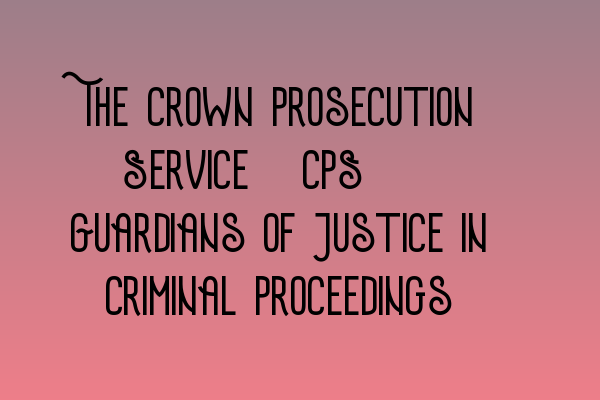The Crown Prosecution Service (CPS): Guardians of Justice in Criminal Proceedings
Welcome to SQE Criminal Law & Practice Law UK, where we explore various aspects of the legal profession. In today’s blog post, we will delve into the crucial role played by the Crown Prosecution Service (CPS) as the guardians of justice in criminal proceedings. The CPS is a vital component of the criminal justice system in the UK, ensuring that the rule of law is upheld and that justice is served.
What is the Crown Prosecution Service?
The Crown Prosecution Service (CPS) is an independent public prosecution authority in England and Wales. It is responsible for investigating and prosecuting criminal cases referred to it by the police and other investigative agencies. The CPS operates under the Code for Crown Prosecutors, which sets out the principles and guidelines for decision-making in criminal cases.
When a criminal case is brought to the CPS, its role is to carefully examine the evidence, assess its strength, and determine whether there is sufficient evidence to prosecute. The CPS operates on the principle of fairness and impartiality, ensuring that prosecutions are only pursued when there is a realistic prospect of conviction and it is in the public interest to do so.
The Role of the CPS in Criminal Proceedings
The CPS plays a crucial role throughout the entire criminal justice process, from the initial investigation to the trial and beyond. Let’s take a closer look at the key responsibilities of the CPS:
- Evidential Review: The CPS carefully reviews the evidence provided by the police or the investigative agency. They assess the quality and reliability of the evidence to determine whether it is sufficient to support a criminal charge.
- Legal Advice: The CPS provides legal guidance to the police and other investigators during the course of an investigation. They help in interpreting complex legal matters and ensuring that the investigation is conducted within the boundaries of the law.
- Charging Decision: Based on the evidence and the Code for Crown Prosecutors, the CPS decides whether to charge a suspect with a criminal offense. This decision is made in accordance with the two-stage test of the Full Code Test: evidential sufficiency and public interest.
- Preparing Cases for Court: The CPS prepares cases for court, including gathering further evidence, analyzing witness statements, and instructing barristers or other legal professionals to present the case in court.
- Court Proceedings: The CPS represents the prosecution during court proceedings. They present the evidence against the accused, cross-examine defense witnesses, and argue the case before the judge and jury.
- Victim Support: The CPS has a duty to ensure that victims of crime are supported and their rights are respected throughout the criminal proceedings. They work closely with victim support organizations to provide necessary assistance and keep victims informed about the progress of the case.
- Appeals and Reviews: In cases where a conviction has been obtained, the CPS may handle appeals against conviction or sentence. They also conduct reviews of cases to identify any potential miscarriages of justice or circumstances where a conviction should no longer be considered safe.
Conclusion
The Crown Prosecution Service (CPS) plays a vital role in the criminal justice system of the UK. With their expertise, fairness, and commitment to upholding the rule of law, they ensure that criminal cases are prosecuted effectively and the interests of justice are served.
If you are preparing for the SQE exams or want to further explore the legal profession, check out our related articles:
- SQE 1 Practice Exam Questions
- SQE 1 Practice Mocks FLK1 FLK2
- SQE 2 Preparation Courses
- SQE 1 Preparation Courses
- SRA SQE Exam Dates
Stay tuned for more informative articles from SQE Criminal Law & Practice Law UK!
